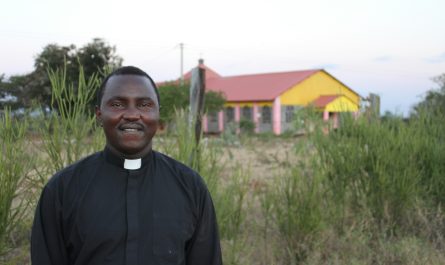We are a generation privileged to have easy access to Scripture everywhere. My house has more tha10 physical Bibles in all manner of translations. And I have no less than three Bible apps on my phone, not including the world wide web where we have all manner of translations within easy reach. Yet for many Christians in our generation, our knowledge of scriptures is scanty. We stand without excuse.
Many of us also struggle to read and understand the Bible. I know I do. There are books I used to avoid, either because they are hard to read (Numbers) or hard to understand (Ezekiel) or I fail to see their relevance to my here and now.
In the book, The Whole Counsel of God: Why and How to Preach the Entire Bible, Tim Patrick and Andrew Reid pose: Could it be that our limited Bible knowledge is a product of limited biblical teaching in our pulpits? “Few church members rise above their leaders.”
The book sets out to encourage preachers to preach the whole Bible from Genesis to Revelation, systematically, because all of it is the word of God.
Pg 22: A light hotchpotch diet of Scripture, even well-taught scripture, is not what God wants for his people.
The authors state that the books of the Bible were intended to be read as coherent wholes, not piecemeal. The Bible is God’s means of communicating to all people the fixed things he wants all to hear. All scripture is God’s word, not just Jesus words quoted verbatim.
The duty of the church leaders is to preach the whole counsel of God and to expound everything that God has revealed through His Word.
What I learned: Scripture is educative and corrective for doctrine and ethics… That the man of God may be complete, equipped for every good work. Scripture is not an end in itself but a means of formation for people for the glory of God and the benefit of others. It has the goal of making those who receive it wise for salvation.
Newer translations of the Bible tend to be more accurate than the older.
Consequences of not preaching the whole Bible:
#Thinking that some books are more important than others
# Narrow or imbalanced theology that causes some important parts of the Word to be neglected.
#Failure to grasp the overall message and shape of scripture.
Gospel theology
We should come to the Bible open to being shaped by its concerns, priorities, agenda, perspectives. In our preaching we must constantly orient our hearers to the larger story and it’s theology as we preach it in small sections, and we must always be showing them the resonances between the parts and the whole.
It is important to offer children the whole Bible and also avoid censoring parts we may deem inappropriate. Instead we should explain these parts in age appropriate terms in order to avoid watering down God’s revelation to them.
If we bring a biblical theological approach to our preaching, Jesus will always be at the centre. Every sermon from every text should throw more light on the message of Jesus, his death and resurrection. The gospel should be clearly presented in every sermon. Every sermon can be a gospel sermon.
Systematic theology allows us to place every scripture in the light of a broader balanced context hence we avoid misinterpretation. What does the rest of scripture say on this issue?
A preacher’s reading of the Bible shapes the reading of many other people. A narrow interpretation will be multiplied by the number of people that accepted it.
The book highly discourages topical sermons – Those drawing single verses across different books especially on the Sunday sermons because they are too jumpy and can be overwhelming and they fail to wrestle with all the big and small things in a text. They also never rise above the knowledge of the preacher. “If we preachers value our people and the whole Bible, we ought to give time to preparing a balanced diet.”
While I understand their heavy inclination towards expository preachings of entire Bible books, I think their criticism of topical sermons is underserved.
The book has a detailed practical guide on how to preach the entire Bible in chapter 10. I highly encourage it for vocational preachers.
I loved the bits about flexibility in the lengths of sermon time, so a preacher can feel equally comfortable preaching a five-minute sermon and a one-hour sermon as need be. Our churches should have allowance for both.
We need to prioritise the ministry of the word in the service and structure the service around the word preached. Corporate worship must be word-centred. We should design all our programmes to flow out of the reading and preaching of the word.
God’s word should infuse everything, from our songs, prayers and sermons.
Criticism of online church
The work of feeding Jesus’s lamb’s with his word is intensely pastoral and missional and requires the local overseer walking closely and sharing life with his people. An internet preacher cannot do this. For the preacher, virtual preaching may lead to the temptation to tailor the message to a broader audience and sideline your primary audience. For members, relying on online sermons robs us of the experience of unity that comes from the local gathering of believers.
We need to listen to sermons from a pastor that is in touch with our reality. Online church de-energises local gospel works, and we need preachers who know us and our needs and who can pastor us, not just preach at us.
Argument for long-term ministry
Being in one place for a long time will enable you to know the congregants and their experiences personally and thereby be sensitive when tackling specific topics that touch them personally. Even if long-term ministry does not look feasible, the orientation should always be toward the same. The goal should always be to work on new parts of the Bible.
Pastoral benefits of long term ministry – it opens doorways into people’s lives. Pg 218 Strong biblical pastoral ministry is not about career advancement but about self-sacrificial caring for God’s people as God’s undershepherd.
Preachers should coordinate to avoid contradictions. Need for pastoral team to share theological convictions to avoid confusing the church. Need to vet guest speakers and their theology. Need for guest speakers to fit in the teaching agenda of the church rather than coming to set their own agenda…
The preachers’ clear focus is knowing and grounding God’s people in the truths of scripture so that these truths feed down into daily lives. This can only happen when the preacher himself is an ongoing student of the Bible. There is need for rigorous and widespread personal Bible reading programs that’s separate from sermon prep, and that engages the whole Bible, not just our favourite books.
The perfect way to attain a biblical word view… “the object of sitting under the whole counsel of God is not just to learn a million separate facts and points of application, but to have our minds transformed to think God’s ways about all of life.” “Placing yourself under the whole counsel of God will make it less likely that you can hide from anything that God wants to speak into your life as you perhaps could if your ministry focused on only one subsection of the Bible. In the end, this is no more than you are asking of your congregation, and so it is entirely appropriate for a preacher to lead the way in submitting himself to every part of scripture.”
Ultimately, Christian ministry is not about program management but about people. The goal of preaching through the whole Bible is so that the congregation’s entire worldview is shaped by the entire of scripture. Our goal in preaching is to serve, not to impress (congregants, seminary teachers, critics etc). That doesn’t mean we shouldn’t aim for excellence but our eyes are the people God has called us to.
Ultimately, Christian ministry is not about program management but about people. The goal of preaching through the whole Bible is so that the congregation’s entire worldview is shaped by the entire of scripture.
Tim Patrick and Andrew Reid
Conclusion. Like Moses we should be able to feed the people of God the whole counsel even if we are not certain of bringing the task completion. “It is better to set the course toward our destination and chart it truly for as far as we can go than to not set out at all.”


